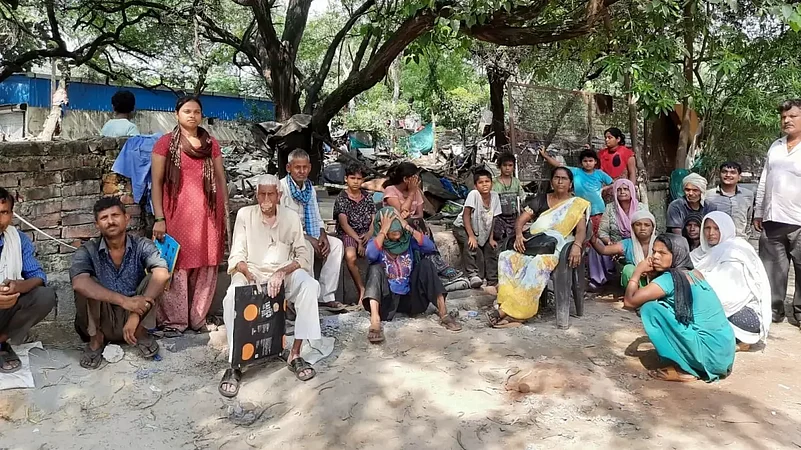Sudha, a college student, supports her family by selling seasonal goods or vegetables on a cart. She sells items like corn, peanuts, and seasonal vegetables, which not just sustains her household but also funds her and her younger brother’s education. It was with great difficulty that she was able to purchase a second-hand laptop that was her pride and joy.
On July 20, as Sudha watched, the bulldozer demolished her hut in which she had grown up. The authorities were bulldozing the only home she knew and did not let her rescue her prized laptop from under the caterpillar wheels that smashed it to dust.
When the Housing and Land Rights team met her, Sudha was staring at the rubble that was her home and that of 100 other families that lived in the settlement in District Park in Delhi’s Nanakpura.
At 8 am that morning, the residents of a settlement at the District Park suddenly woke up to find bulldozers standing ready to raze their jhuggis in a sudden “anti-encroachment” drive by the Delhi Development Authority (DDA). These 100 families, who were rendered homeless in less than a few hours, had lived on the site for four decades. The residents said they were not even granted enough time to collect their belongings before the bulldozers razed their homes to the ground.
“They didn't let us take anything, not even essential items like food and ration. Everything we had was destroyed,” said a person.
This demolition took place at the time when Delhi was experiencing one of its worst spells of rainfalls. Large parts of Delhi were flooded, affecting many of the city’s underprivileged. Not surprising, the timing of the demolition has been seen as particularly punitive and cruel on part of the DDA.
According to the affected residents, the demolition was executed with an intimidating display of force by the state security personnel, rendering any attempts at negotiation or protest futile. The people whose houses were demolished had not received any prior notice or information regarding the eviction in contravention of laws that mandate such notifications before any demolition or eviction.
The pradhan of the settlement said the demolition took place even as a court case with the Delhi Urban Shelter Improvement Board was supposedly sub judice in the Patiala House District Court.
The pradhan said, “All of a sudden, they came with a bulldozer and police force on the morning at 8. The court had not given any final judgment. How can they just come and demolish without waiting for the court’s final verdict?"
The tragedy here, as is often the case in such instances, is that the vulnerable people put themselves in the hands of lawyers who themselves have little idea of what to do and how to proceed.
The pradhan added, “We are not educated people who can understand these court processes. Whatever the lawyer asked, we did. But we don't know what lies next.”
Of course, the lawyer disappeared, leaving behind hapless homeless people who had no idea of what recourse they had. While on the 26th, the lawyer was telling everyone that he proposed to raise the issue of no notice being issued and also raise the plea for compensation, he told everyone the next day that he has withdrawn the case since the demolition has already occurred. There was no response to repeated calls to him asking for details of the case he is supposed to have filed.
The demolitions are in violation of the landmark judgment of Sudama Singh & Others Vs Government Of Delhi (2010). In the judgement, the Delhi High Court held that before any eviction, it was the duty of the state to survey all those facing evictions and to draft a rehabilitation plan in consultation with the “persons at risk”.
Shanta Devi, a representative from the Housing and Land Rights Network (HLRN), who visited the location soon after receiving information of the demolition, highlighted that almost every family whose homes were demolished possessed records to validate their presence in the area.
Mukesh, one of the residents staying there, mentioned that his father has been living there for over 40 years.
“We have all our family’s Aadhar cards registered at the same address in the basti. A few years ago, my father even got a telephone line, for which we have all the bills,” said Mukesh.
Unfortunately, when the demolition occurred, Mukesh and his family were visiting their native village in Gorakhpur, Uttar Pradesh. Upon returning, they found it nearly impossible to retrieve those documents as their house had been demolished. Mukesh returned to Delhi the day after the demolition.
As with most of Delhi, this informal settlement too was inhabited by people from neighbouring states. In this case, the majority of the people belonged to UP. However, their identity proof was from Delhi and they had electricity meters for which they had been paying bills for years. They were also taking the benefits of the 200 units of free electricity provided by the Delhi government. Few years back, through the help of a local MLA, the community got a community water stand post as well. There is even a community toilet facility which still stands amidst the rubble post demolition.
Beside Sudha’s tragedy, an even more heart-wrenching aspect of the demolition was the callous disregard for the education of the children in these jhuggis. With no warning or time to prepare, young students were left devastated as their books, notebooks, and study materials were reduced to debris. This loss poses a significant setback for their education and future prospects. Both of Mukesh’s children were studying in the nearby government school, but they cannot go back to school anymore because they have no bags, books, or notebooks left.
“They are not going to school now. I don’t know when we'll be in a state to start sending them back,” said Mukesh.
In the aftermath of the demolition, the displaced families face a bleak and uncertain future. With nowhere else to turn, some have sought temporary shelter near the gurdwara nearby while struggling to arrange for even the most basic meals. Adding to the anguish, some families had no stable savings or livelihoods, which has left them in a vulnerable and precarious situation.
As the dust settles, the site remains scattered with rubble, and displaced families continue to plead for justice and assistance. The repercussions of this sudden and unannounced demolition are felt deeply, underscoring the urgent need for a more compassionate and equitable approach to urban development and housing policies.
The case of Nanakpura is not unique. Since last year, Delhi has witnessed multiple cases of evictions. For instance, a demolition drive in Tughlakabad in April left almost 1,000 families homeless. The 2021 forced eviction report of HLRN reveals that between January 1 2022 and July 15, 2022, state authorities across the country demolished over 25,800 homes, affecting at least 1,24,450 people.
The people of the Nanakpura are still living amidst the rubble of their former colony, trying to survive with the bare minimum of whatever they could salvage from the demolition. Mukesh asserted, “We were living with dignity here. They have not just demolished our house but have taken away our honour and respect as well.”
(Enakshi Ganguly is the Executive Director of Housing and Land Rights Network [HLRN] and Honorary Professor at National Law University, Odisha. She also the co-founder of HAQ: Centre for Child Rights. Anuj Behal is an urban researcher and is currently a research associate at HLRN. Views expressed are personal to the authors.)

















